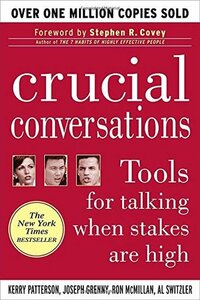Take a photo of a barcode or cover
708 reviews for:
Crucial Conversations: Tools for Talking When Stakes Are High
Ron McMillan, Kerry Patterson, Al Switzler, Joseph Grenny
708 reviews for:
Crucial Conversations: Tools for Talking When Stakes Are High
Ron McMillan, Kerry Patterson, Al Switzler, Joseph Grenny
This book came highly recommended to me by many coworkers, but I struggled with it and feel that there is probably a better book out there for me.
It brings up some solid points, such as...
-remembering that the other person you're speaking with is a human too and asking “Why would a reasonable, rational and decent person do what this person is doing?”
-any set of facts can be used to tell an infinite number of stories.
-asking "what do I really want for myself, for others and for this relationship?"
-the contrasting tool, i.e. "I don't want you to think this but I am concerned about that."
I did also appreciate solid examples of language that can be used in various examples.
However, I feel like the points get lost in the generalized "tool" names that blur together and rely heavily on acronyms that aren't easily remembered. When you're being told to STATE Your Path and CRIB and Learn to Look, you very quickly lose track of what all of those means. Additionally, I didn't love the testimonials; they felt very inauthentic, like who could praise CC the most so that they could be published.
I don't know that this is my go-to recommendation for this topic, but I'm glad I finally read it.
It brings up some solid points, such as...
-remembering that the other person you're speaking with is a human too and asking “Why would a reasonable, rational and decent person do what this person is doing?”
-any set of facts can be used to tell an infinite number of stories.
-asking "what do I really want for myself, for others and for this relationship?"
-the contrasting tool, i.e. "I don't want you to think this but I am concerned about that."
I did also appreciate solid examples of language that can be used in various examples.
However, I feel like the points get lost in the generalized "tool" names that blur together and rely heavily on acronyms that aren't easily remembered. When you're being told to STATE Your Path and CRIB and Learn to Look, you very quickly lose track of what all of those means. Additionally, I didn't love the testimonials; they felt very inauthentic, like who could praise CC the most so that they could be published.
I don't know that this is my go-to recommendation for this topic, but I'm glad I finally read it.
The book provides some strategies to handle high-stakes discussions that can happen at work or in our personal lives. Some of the examples might seem really specific but the overall theme of the book is to always take a step back and think about what the end goal of a discussion is and then move towards a common solution. Although I don't remember each piece of advice that was outlined in the book, I understand a few common themes and would try and use them in my day-to-day life. Let's see how that goes :)
informative
informative
slow-paced
informative
medium-paced
This book reviews the ways in which we can have sensitive conversations in a successful way. While the book itself has a number of good ideas and suggestions, none of it is ground breaking. It's written in a conversational style with anecdotal stories throughout. It's meant as a self-help book, not a well sourced review of research. While it was nice to have a management book that was readable, I would have liked more reasoning behind their logic as well as less casual language.
challenging
informative
slow-paced
If you get a chance to take this as a professional development course, do it. The class is 4 stars. The book itself is 2 stars. Not something to sit down and read straight through.




